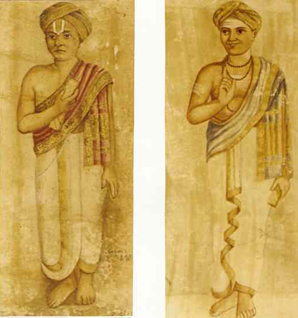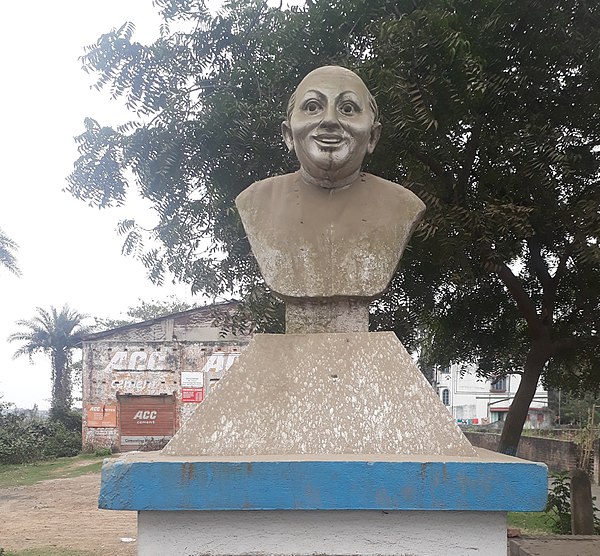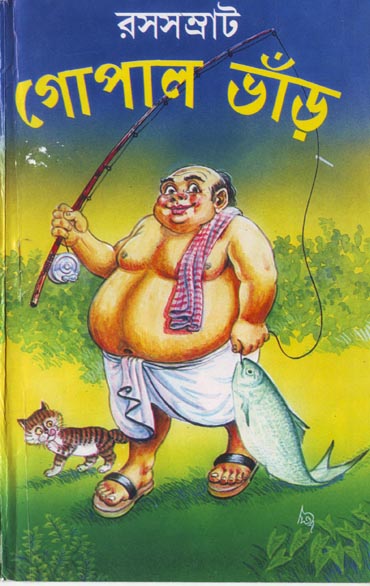Trinity of Satire in Medieval India
Written by : Amita Roy
Dated: March 22,2018
Share

*Raja Birbal / Wikimedia/ British Library
Medieval India
What are the vision, images and symbols that first come to our mind?! Mughals, fine architecture, court intrigues, blood bath full of wars and battles for power, invasions, a life where lighter side of things were absent. Basically, this is the impression that the general educated population of India might have. A heavy gory life. But not many knows about the fact that there were a lighter side of life present in those era which was not only witty and intelligent, but humorous and satirical as well weaved into the political cover of the administration.
In medieval India, three particular kingdoms existed side by side; the Mughal empire in the north, the Vijaynagar kingdom in the south and Krishnanagar royal estate which was one of the 5 big prominent zamindaries of Bengal. These kingdoms had their share of ups and downs but there have been reliefs in the form of satire which was immortalized by certain people or characters who were very dear to their respective rulers. Such three immortal names chronologically were – Tenali Rama of Vijaynagar kingdom, Birbal of Mughal empire and Gopal Bhar of Krishnanagar Raj. Let’s check out this trinity of laughter.
TENALI RAMA
Chronologically speaking, Tenali Rama belongs to the earliest of this trinity. Born as Garlapati Ramakrishna in a Telugu Brahmin Saivite family during the early part of the 16th century, his father served as a priest at Ramalingeswara temple in Tenali. When Tenali Rama was young, his father died and his mother returned to her maternal home in Tenali to stay with her brother. Though he did not received formal education during childhood, but went on to become a great scholar due to his thirst of knowledge. He later converted to Vaishnavism.

Tenali Rama /Wikimedia
His luck changed when he came to Vijaynagar as a member of the famous troupe named ‘Bhagavatha Mela’. Impressed by his performance and getting to know about his sad childhood, Krishnadevaraya who was the ruler of Vijaynagar kingdom granted him the post of comic poet or Vikata Kavi completing the Ashta Diggajas or the 8 scholars in the court of Krishnadevaraya similar to Akbar’s Navaratnas. Tenali Rama not only protected the kingdom from Delhi Sultanate due to his wit but also was a gifted literary scholar. His KÄvya (poetry) Panduranga Mahatyam is hailed as one of the Five Great Kavyas of Telugu literature. It was based on the greatness of Lord Pandurang of Pandharpur. Later movies were made on his life in Telugu and Tamil and Cartoon Network also aired a series ‘The dventures of Tenali Rama’.
BIRBAL
One of the most intelligent courtier and adviser to Mughal Emperor Akbar, Birbal is remembered in history due to his wit and intelligence which has passed down to us through the folk tales. Birbal was born as Mahesh Das in 1528 in a Hindu Brahmabhatt family in Sidhi district of Madhya Pradesh. He was the 3rd son and the family was already associated with poetry and literature. He was educated in Hindi, Sanskrit and Persian. He wrote prose in Persian language and also served the Rajput court of Rewa where he was known as Brahma Kavi.
.jpg) Raja Birbal's house in Fatehpur Sikri / Wikimedia
Raja Birbal's house in Fatehpur Sikri / Wikimedia
There is a dispute about the date of Akbar making Birbal the poet laureate but it was somewhere between1556-1562. It was Akbar who bestowed upon him the name Birbal with Raja as Title. Birbal gradually displayed his increased influence by becoming one of the 9 gems or Navaratnas in the court of Akbar. Despite having a decade of age gap, Akbar considered Birbal as one of his most trusted friend, ally and confidant. Soon Birbal played the role of religious advisor, military figure, and close friend serving Akbar for 30 years. Birbal’s first military role was in 1572, where he was sent to save Husein Quli Khan from Akbar’s foster brother, Hakim Mirza. Later, he accompanied Akbar to many military campaigns in Gujarat and despite not having any military training, were given leadership role on the field.
Court historians of Akbar like Abul Fazl and Badayuni though praised Birbal due to his intelligence but also couldn’t stand the fact that he was a Hindu. Akbar often regarded him as the best gem of his Navaratna. Not only that, Raja Birbal was given a two storeyed house within the fort near Akbar’s residence which implies their closeness and friendship. Birbal was also the only Hindu who accepted Akbar’s new religion Din – I – Illahi. Birbal was not only the only courtier to stay within the palace complex but also had a gate named after him out of the 7 gates in Fatehpur Sikri.
Unfortunately Birbal was killed in Attock in 1586 when he was sent by Akbar to control a Afghan rebellion. His death was a shock to Akbar who considered it as the biggest mishap since his arrival to the throne. The friendship stories between Akbar and Birbal continued as oral traditions which were passed down to us as books, stories, folklores. Most tales are humorous showing Birbal outsmarting the other courtiers.
GOPAL BHAR
Gopal Bhar was the court jester of Raja Krishnachandra of Nadia in present day Krishnanagar. The 18th century king considered him as a Navaratna as he used to make others laugh and sometimes ridicule too. Gopal was born in a low caste family but was highly intelligent. It made many Brahmins jealous. His father died when he was young and his mother was burned in Sati daha. He had a older brother who was abducted by the robbers and Gopal was raised by a kind woman. His luck changed after entering Krishnanagar Raj.

Bust of Gopal Bhar in Ghurni, Krishnanagar /Wikimedia
All these 3 witty and intelligent personas had powerful patrons who helped them to blossom and brought out their best talent. They not only rose in power, but also became trusted friends and close confidants of their patrons. All these 3 more or less came from under privileged backgrounds but that did not take away their zeal for excellence. In modern day popular culture, this trinity of humor and satire has been encashed as movies, soap operas, cartoons and books.

Comic book on Gopal Bhar in Bengali /Wikimedia
